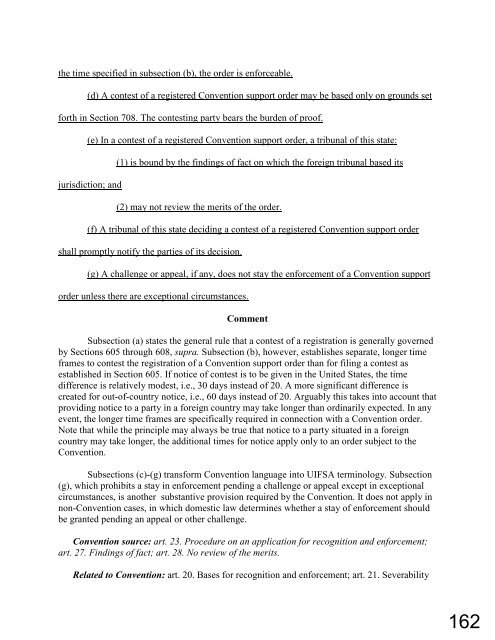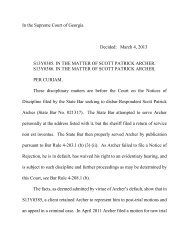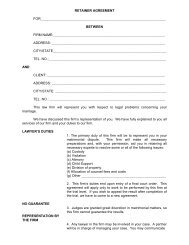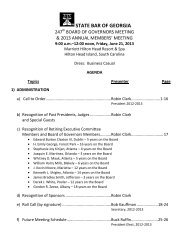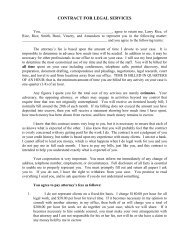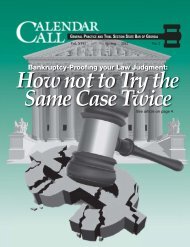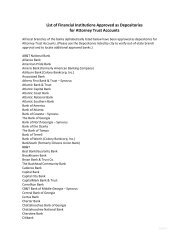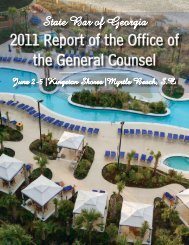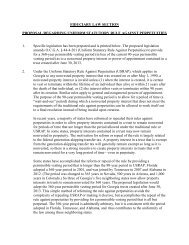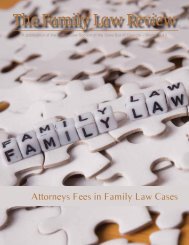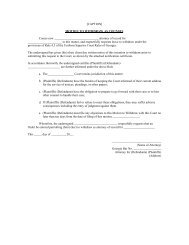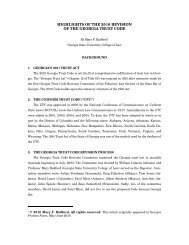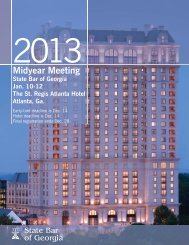2008 Amendments to the Uniform Interstate Family Support Act ...
2008 Amendments to the Uniform Interstate Family Support Act ...
2008 Amendments to the Uniform Interstate Family Support Act ...
You also want an ePaper? Increase the reach of your titles
YUMPU automatically turns print PDFs into web optimized ePapers that Google loves.
<strong>the</strong> time specified in subsection (b), <strong>the</strong> order is enforceable.<br />
(d) A contest of a registered Convention support order may be based only on grounds set<br />
forth in Section 708. The contesting party bears <strong>the</strong> burden of proof.<br />
(e) In a contest of a registered Convention support order, a tribunal of this state:<br />
jurisdiction; and<br />
(1) is bound by <strong>the</strong> findings of fact on which <strong>the</strong> foreign tribunal based its<br />
(2) may not review <strong>the</strong> merits of <strong>the</strong> order.<br />
(f) A tribunal of this state deciding a contest of a registered Convention support order<br />
shall promptly notify <strong>the</strong> parties of its decision.<br />
(g) A challenge or appeal, if any, does not stay <strong>the</strong> enforcement of a Convention support<br />
order unless <strong>the</strong>re are exceptional circumstances.<br />
Comment<br />
Subsection (a) states <strong>the</strong> general rule that a contest of a registration is generally governed<br />
by Sections 605 through 608, supra. Subsection (b), however, establishes separate, longer time<br />
frames <strong>to</strong> contest <strong>the</strong> registration of a Convention support order than for filing a contest as<br />
established in Section 605. If notice of contest is <strong>to</strong> be given in <strong>the</strong> United States, <strong>the</strong> time<br />
difference is relatively modest, i.e., 30 days instead of 20. A more significant difference is<br />
created for out-of-country notice, i.e., 60 days instead of 20. Arguably this takes in<strong>to</strong> account that<br />
providing notice <strong>to</strong> a party in a foreign country may take longer than ordinarily expected. In any<br />
event, <strong>the</strong> longer time frames are specifically required in connection with a Convention order.<br />
Note that while <strong>the</strong> principle may always be true that notice <strong>to</strong> a party situated in a foreign<br />
country may take longer, <strong>the</strong> additional times for notice apply only <strong>to</strong> an order subject <strong>to</strong> <strong>the</strong><br />
Convention.<br />
Subsections (c)-(g) transform Convention language in<strong>to</strong> UIFSA terminology. Subsection<br />
(g), which prohibits a stay in enforcement pending a challenge or appeal except in exceptional<br />
circumstances, is ano<strong>the</strong>r substantive provision required by <strong>the</strong> Convention. It does not apply in<br />
non-Convention cases, in which domestic law determines whe<strong>the</strong>r a stay of enforcement should<br />
be granted pending an appeal or o<strong>the</strong>r challenge.<br />
Convention source: art. 23. Procedure on an application for recognition and enforcement;<br />
art. 27. Findings of fact; art. 28. No review of <strong>the</strong> merits.<br />
Related <strong>to</strong> Convention: art. 20. Bases for recognition and enforcement; art. 21. Severability<br />
162


